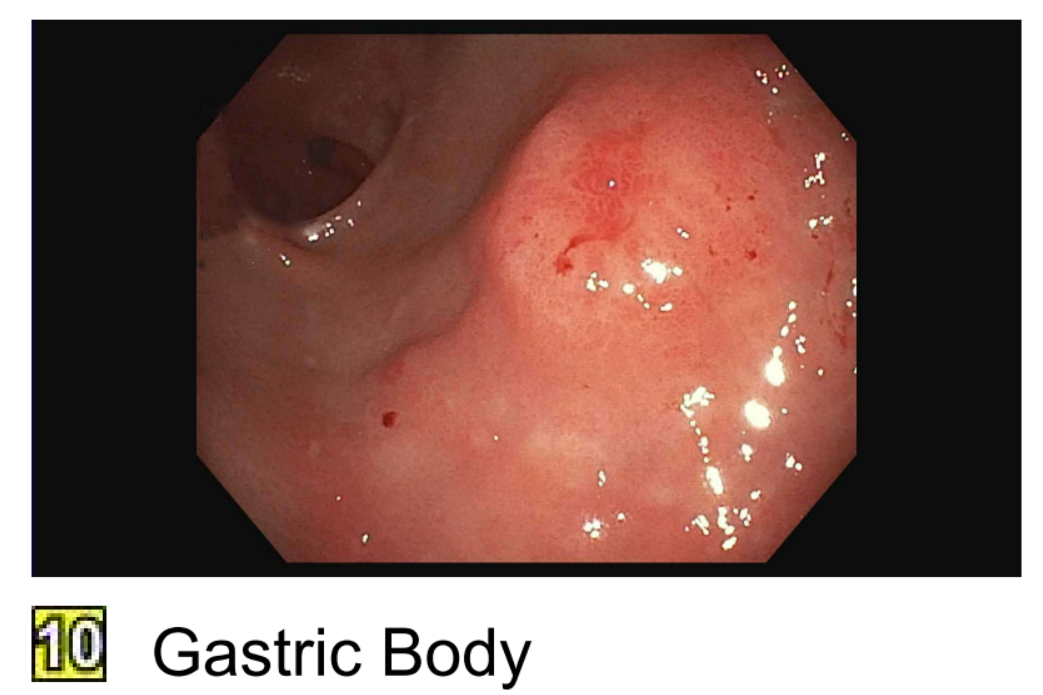Tuesday Poster Session
Category: Stomach and Spleen
P6346 - Gastric Metastasis of Invasive Ductal Carcinoma: A Rare and Underdiagnosed Manifestation of Breast Cancer
Tuesday, October 28, 2025
10:30 AM - 4:00 PM PDT
Location: Exhibit Hall
.jpg)
Ammar Ismail, MD (he/him/his)
Jersey City Medical Center
Bayonne, NJ
Presenting Author(s)
Ammar Ismail, MD1, Fnu Soxi, MD2, Meray Hosni, 2, Loren Odam, 2, Saba Altarawneh, MD2, Jennifer Hsieh, MD2, Joseph DePasquale, MD2
1Jersey City Medical Center, Bayonne, NJ; 2Jersey City Medical Center, Jersey City, NJ
Introduction: Breast cancer is the most common cancer in women, with 2.3 million new cases diagnosed globally each year. Common metastatic sites include the liver, lungs, and brain, whereas gastric involvement is rare. Gastric metastases typically present with nonspecific symptoms such as epigastric pain, nausea, or hematemesis, making diagnosis challenging and often delayed. This case report highlights a rare presentation of stage IV invasive ductal breast carcinoma initially presented with vague abdominal symptoms.
Case Description/
Methods: A 62-year-old female with a history of a ruptured brain aneurysm, seizure disorder, stroke in 2021, and recent onset postprandial nausea and vomiting, presented with a palpable right breast mass which was confirmed by biopsy on 6/17/2024 to be an invasive ductal carcinoma, ER 100%, PR 90%, HER2-negative by FISH. On 6/24/2024, she was admitted for worsening postprandial nausea and vomiting. CT chest/abdomen/pelvis showed diffuse mixed lytic and sclerotic osseous metastases and several nonspecific subcentimeter liver lesions. The cancer was deemed incurable, and she was discharged on Letrozole, and ondansetron. However, the patient presented again with non-resolving GI symptoms and an EGD on 8/1/2024 revealed hemorrhagic, erythematous mucosa throughout the stomach with a thickened pre-pyloric fold. Gastric biopsies confirmed metastatic breast ductal carcinoma. Given the disease progression, the family chose hospice care, and the patient was discharged to home hospice.
Discussion: Gastric metastasis from breast cancer is uncommon, with incidence estimated at 0.1–0.3%, but autopsy studies suggest up to 18%, indicating under-recognition. Most cases develop years after breast cancer diagnosis, but in this patient, nonspecific gastrointestinal symptoms—nausea and vomiting—preceded the breast cancer diagnosis, lowering clinical suspicion for metastasis. Gastric metastases most commonly arise from invasive lobular carcinoma (ILC), which is attributed to E-cadherin loss in ILC, which enhances tumor spread. Despite this, our patient had immunohistochemistry-confirmed metastatic ductal carcinoma. Systemic treatment is typically with hormonal or chemotherapy. Literature reports partial remission in 46% of cases, with a median survival of 10 months following diagnosis. This case underscores the importance of considering gastric metastasis in breast cancer patients with vague gastrointestinal symptoms, even before a known cancer diagnosis.

Figure: EGD showing a submucosal mass in Gastric body
Disclosures:
Ammar Ismail indicated no relevant financial relationships.
Fnu Soxi indicated no relevant financial relationships.
Meray Hosni indicated no relevant financial relationships.
Loren Odam indicated no relevant financial relationships.
Saba Altarawneh indicated no relevant financial relationships.
Jennifer Hsieh indicated no relevant financial relationships.
Joseph DePasquale indicated no relevant financial relationships.
Ammar Ismail, MD1, Fnu Soxi, MD2, Meray Hosni, 2, Loren Odam, 2, Saba Altarawneh, MD2, Jennifer Hsieh, MD2, Joseph DePasquale, MD2. P6346 - Gastric Metastasis of Invasive Ductal Carcinoma: A Rare and Underdiagnosed Manifestation of Breast Cancer, ACG 2025 Annual Scientific Meeting Abstracts. Phoenix, AZ: American College of Gastroenterology.
1Jersey City Medical Center, Bayonne, NJ; 2Jersey City Medical Center, Jersey City, NJ
Introduction: Breast cancer is the most common cancer in women, with 2.3 million new cases diagnosed globally each year. Common metastatic sites include the liver, lungs, and brain, whereas gastric involvement is rare. Gastric metastases typically present with nonspecific symptoms such as epigastric pain, nausea, or hematemesis, making diagnosis challenging and often delayed. This case report highlights a rare presentation of stage IV invasive ductal breast carcinoma initially presented with vague abdominal symptoms.
Case Description/
Methods: A 62-year-old female with a history of a ruptured brain aneurysm, seizure disorder, stroke in 2021, and recent onset postprandial nausea and vomiting, presented with a palpable right breast mass which was confirmed by biopsy on 6/17/2024 to be an invasive ductal carcinoma, ER 100%, PR 90%, HER2-negative by FISH. On 6/24/2024, she was admitted for worsening postprandial nausea and vomiting. CT chest/abdomen/pelvis showed diffuse mixed lytic and sclerotic osseous metastases and several nonspecific subcentimeter liver lesions. The cancer was deemed incurable, and she was discharged on Letrozole, and ondansetron. However, the patient presented again with non-resolving GI symptoms and an EGD on 8/1/2024 revealed hemorrhagic, erythematous mucosa throughout the stomach with a thickened pre-pyloric fold. Gastric biopsies confirmed metastatic breast ductal carcinoma. Given the disease progression, the family chose hospice care, and the patient was discharged to home hospice.
Discussion: Gastric metastasis from breast cancer is uncommon, with incidence estimated at 0.1–0.3%, but autopsy studies suggest up to 18%, indicating under-recognition. Most cases develop years after breast cancer diagnosis, but in this patient, nonspecific gastrointestinal symptoms—nausea and vomiting—preceded the breast cancer diagnosis, lowering clinical suspicion for metastasis. Gastric metastases most commonly arise from invasive lobular carcinoma (ILC), which is attributed to E-cadherin loss in ILC, which enhances tumor spread. Despite this, our patient had immunohistochemistry-confirmed metastatic ductal carcinoma. Systemic treatment is typically with hormonal or chemotherapy. Literature reports partial remission in 46% of cases, with a median survival of 10 months following diagnosis. This case underscores the importance of considering gastric metastasis in breast cancer patients with vague gastrointestinal symptoms, even before a known cancer diagnosis.

Figure: EGD showing a submucosal mass in Gastric body
Disclosures:
Ammar Ismail indicated no relevant financial relationships.
Fnu Soxi indicated no relevant financial relationships.
Meray Hosni indicated no relevant financial relationships.
Loren Odam indicated no relevant financial relationships.
Saba Altarawneh indicated no relevant financial relationships.
Jennifer Hsieh indicated no relevant financial relationships.
Joseph DePasquale indicated no relevant financial relationships.
Ammar Ismail, MD1, Fnu Soxi, MD2, Meray Hosni, 2, Loren Odam, 2, Saba Altarawneh, MD2, Jennifer Hsieh, MD2, Joseph DePasquale, MD2. P6346 - Gastric Metastasis of Invasive Ductal Carcinoma: A Rare and Underdiagnosed Manifestation of Breast Cancer, ACG 2025 Annual Scientific Meeting Abstracts. Phoenix, AZ: American College of Gastroenterology.
